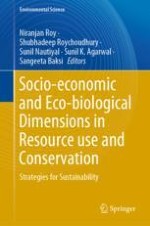2020 | OriginalPaper | Buchkapitel
Emerging Technology Intervention Model of Core Support for Inclusive Rural Growth: Social–Economic–Ecological Interface Building Through Innovative Scalable Solutions and Effective Delivery Mechanism
verfasst von : Sunil K. Agarwal
Erschienen in: Socio-economic and Eco-biological Dimensions in Resource use and Conservation
Aktivieren Sie unsere intelligente Suche, um passende Fachinhalte oder Patente zu finden.
Wählen Sie Textabschnitte aus um mit Künstlicher Intelligenz passenden Patente zu finden. powered by
Markieren Sie Textabschnitte, um KI-gestützt weitere passende Inhalte zu finden. powered by
